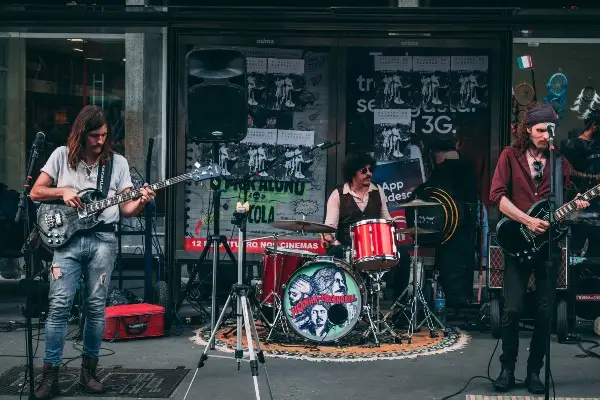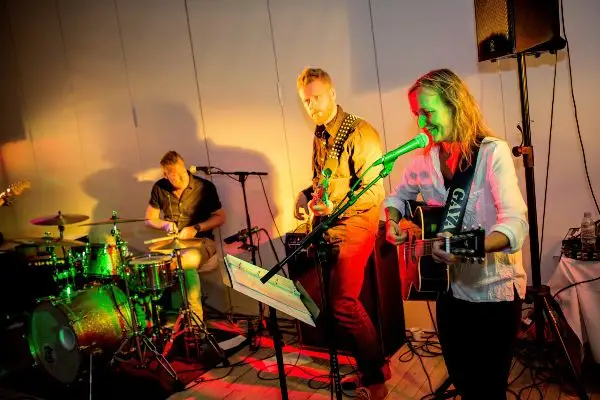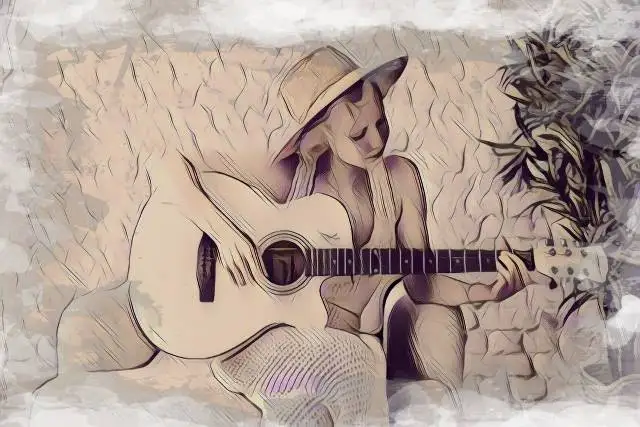Learning how to write a hit song can feel incredibly intimidating. After all, hit songs feel so effortless that it can be hard to comprehend how these songs were written in the first place. Fortunately, most hit songs share a variety of similarities that can be used as lessons for you to start writing your own budding bangers.
Below, we'll dive into the anatomy of a hit song so that you can become your own songwriter. Let's dive in!
Define What A Hit Song Means To You
Before thinking about the elements of a hit song, you have to define what a "hit" means to you. Sure, a chart-topping song is an obvious sign of success, but it can take years of marketing and making to reach this level of notoriety. Defining your current trajectory for success can take off some of the pressure, and help you write better songs.
Maybe a hit for you is creating a song that perfectly encapsulates a personal experience. Maybe your songwriting goal is to start focusing on making catchier melodies. Perhaps you want to focus more on having a memorable song structure.
Whatever it may be, allow yourself to focus on one element at a time while improving your songwriting skills. Contrary to what some may below, hits are years in the making: That means an "overnight success" put in years of hard work before breaking through.
Songs written early in an artist's career can be excellent, or they could be lackluster. The important thing to note is that either artist can make a hit over the course of their career so long as they put in the work with consistent songwriting.
For instance, not a lot of people remember the first Michael Jackson song, "Got to Be There", but he went on to create an endless sea of hit songs:
What Makes A Song Successful?
Most hit songs follow similar patterns that make them appealing to the vast majority of listeners. We'll analyze some of the key elements every songwriter should focus on to make an amazing song:
Relatability
When you hear music, what leads you to connect to one piece of art over another? Chances are, it's not a record executive marketing strategy or how many dollars were put behind an advertisement campaign. These boosters can help, but great music still holds weight without the help of a professional team.
We connect with songs because they are relatable to our own personal experiences. The art of songwriting is taking complex emotions, and condensing them into palatable, lyrical phrases that listeners can connect with.
It's up to you to break down those barriers as a songwriter. What could you say that makes a listener instantly feel like they know you or the feeling you're describing? How can you break down those walls? It's all about consciously crafting reliability.
Familiarity
As audiophiles or musicians, many of us like to hear something that we haven't heard before. However, it's important to keep in context that the vast majority of average listeners are more attuned to more familiar songwriting patterns.
It's totally normal to take inspiration from other artists and songs, in fact, it's advisable. You'll certainly want to make songs your own, but finding inspiration in common chords, melodies, and song structures can help you craft killer music.
Novelty
The best songs have enough familiarity to draw in skeptical listeners and just enough novelty to help you earn dedicated listeners. Whenever you're writing songs, you should figure out what your unique angle is. What makes your song special? Is it the songwriting? The catchy production? The relatable song topic? A combination of all of these elements? It should be obvious why your song stands out from the crowd.
Obvious Craft
Awesome songwriting takes plenty of practice. Don't be discouraged if your first tracks sound nothing like hit songs. Just take a listen to Ed Sheeran's first published work:
He's clearly honed his craft over the past years. Writing amazing music takes writing a bunch of sub-par music. It could take years to develop your own sound, but don't let that discourage you! Try to remember that any musician can become a great artist if they're willing to put enough time and effort into their story and what they're making.
Strong Songwriting
If you are an amazing songwriter with a deep understanding of song structure and craft, you're set. There's a reason why folk and other acoustic, fairly instrumentally barren works still retain popularity to this day. Excellent songwriting can make up for lack of production or instrumental complexity because it cuts through the noise. If your music is able to resonate deeply with a listener, you've found a way to reach them.
Your lyrics should be able to hold their own without the help of a melody or backing chord progression. You'll want to implement elements of clever wordplay like metaphor, hyperbole, and foreshadowing.
How To Write A Hit Song in 7 Steps
Now that you understand the key ingredients to a hit song, it's time to put your knowledge into practice. Note that these steps don't necessarily have to be executed in the listen order; we just want to provide a basic framework in case you don't know where to start. Without further ado, here's exactly how to write a hit song.
1. Find Your Theme
Every great song needs a strong, cohesive theme that's felt throughout the entire piece. Before even writing a lyric or melody, have a brainstorm with yourself and figure out the meaning behind your song.
If you can draw from personal experiences, that's awesome! Writing about something that's authentic to you will come across as more genuine and help you connect on a deeper level with your listeners.
Pick a couple of buzzwords you'll want to include in your song that encapsulates your feelings towards your subject of choice.
2. Build Your Lyrics
Start to cultivate phrases and full-blown lyrics from your brainstorm. Your lyrics should be strong enough to read as a poem, holding meaning tied to your theme, and ideally, incorporating rhyme and other literary devices.
However, don't hyperfocus too much on the little details. You can always go back and tweak words as you see fit. Too much self-reflection early on can prevent you from moving on to a deeper stage in the process. Write the best lyrics you can, but have the courage to continue. It's easy to get in your own head about things, but know that you'll have time to come back and revise your creation with more context.

3. Find A Chord Progression
Chord progressions are the building blocks of any song, so you'll want to integrate your chord pattern into your music as soon as possible. Thankfully, there are plenty of tried and true pop chord progressions to try out if you don't know where to begin. Opt for a simple chord song structure like I – ii – IV – V or I – V – vi – IV.
4. Build Melodies and Basslines
Once you've decided on some melodies or basslines, you can start to riff on top of your creation. Break out your voice memos app or DAW and start recording on top of your lyric and chord progression combo. Let your creativity flow, and build up your song as you see fit.
5. Put It All Into Context
You now have all of the melodic elements of your song. To take it a step further, at some rhythm with drums to get your groove going. Focus on the relationship between all of the individual parts of your song. Are they all gelling together in one, cohesive context? Adjust your parts to make them flow as one, robust unit.
6. Edit Your Work
Now that you've added instrumental and melodic elements to your song, it's time to edit your creation. Take a day to sleep it over, and then make improvements to your music. Can you create a catchier melody? Make room for more clever wordplay? Trust your instincts and make your revisions.
7. Perform Your Music Live
There's something about playing a song live that puts everything into perspective. Playing music live is also an amazing way to network and widen your reach as a musician. Get out there and play your song to a friend, at open mic nights, or at your own show! See if you learn anything while playing live that can help you improve your songwriting further.
Tips On How To Write A Hit
Are you ready to write your first amazing song? Here are some pro songwriting tips to help you make your first hit:
Imitate and Embellish
In order to become an amazing hit songwriter, you need to take the time to listen to well-crafted songs. Take it upon yourself to study music with critical listening. Whenever you find a song that compels you to learn more about an artist or take a deep dive into their discography, you know that something special is at play.
Try to figure out what is leading you to dive deeper into an artist. Take what you learn from observing and reapply those lessons back into your own art.

Don't Be Afraid To Give Into The Magic of Music
Sometimes, there's no rhyme or reason to the songwriting or music-making process. You'll find that some songs will take months to develop, while others you can churn out in less than an hour. Don't let these inconsistencies discourage you.
Not every hitmaker writes music the same way and that's okay. Allow yourself to find what works best for you and adjust your process along the way. As with any art form, there is no one right way to create. Your creation process is constantly evolving based on your needs at any given time.
Quantity Breeds Quality
Hit songs don't write themselves. While you might get lucky and write a true hit within your first couple of writing sessions, this isn't typical for most musicians. Most artists, even those who are naturally gifted, have to write a bunch of bad songs in order to finally craft a strong one.
Allow yourself to fail and experiment -- it's the only way to improve your skillset. thankfully, quantity tends to breed quality, so if you're writing often and striving to get better, you're bound to make an amazing song at some point in your career.
Listen To A Wide Variety of Music
Listening to different genres of music will make you more informed as a songwriter and a musician. It can also help you understand why hits are so popular and what musical elements tend to do well across all genres. Challenge yourself to listen outside of your go-to genres on a regular basis for the sake of your art and language as a musician.
Work With Other Artists
There's a reason that the majority of today's top artists have a whole team of writers, creatives, and other sonic visionaries. Learning to work well with other artists is key to your success as a musician.
The good news is that virtually anyone can get started with creative collaboration, even if you're relatively new to the music industry. You could easily start a writing circle or regular jam session with your friends or local musicians.
If you don't know anyone who might be interested, you can find people for online collaboration via social media or Reddit threads. Another baby step is making use of "open verse" challenges or the "duet" feature on TikTok. Networking is key to becoming a successful artist within the music industry, so find a way to get started, regardless of where you are in your career.
Learning how to write a hit song is easy; putting it into practice can be a real challenge. The reality is that creating a hit can take years of focused, hard work. Hopefully, this guide makes it easier for you to tap into your songwriting skills and get closer to writing your breakout hit. Enjoy the songwriting process!





